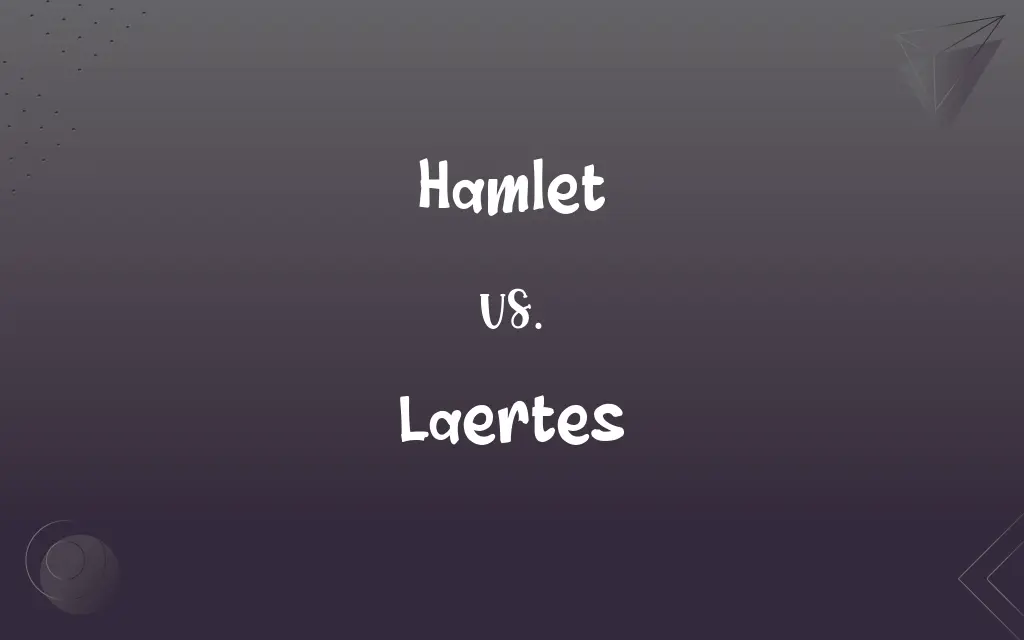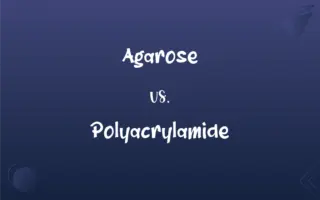Hamlet vs. Laertes: What's the Difference?
Edited by Aimie Carlson || By Harlon Moss || Published on February 24, 2024
Hamlet, the protagonist of Shakespeare's play, is introspective and philosophical, struggling with existential questions. Laertes, a secondary character, is impulsive and action-oriented, seeking immediate revenge.

Key Differences
Hamlet is characterized by his deep introspection and philosophical nature, often contemplating life and death. Laertes is more straightforward and action-driven, focusing on avenging his father's death without much introspection.
Hamlet struggles with indecision and moral dilemmas, reflecting on the consequences of his actions. In contrast, Laertes acts impulsively, guided by emotions rather than deep contemplation.
Hamlet’s approach to revenge is methodical, as he seeks proof and contemplates the morality of his actions. Laertes, however, rushes into revenge without seeking validation or considering the broader implications.
Hamlet is haunted by his father’s ghost, driving his quest for truth and justice. Laertes, on the other hand, is motivated by his father Polonius’s murder and his sister Ophelia’s madness and death.
Hamlet often communicates through complex soliloquies, revealing his inner conflicts and thoughts. Laertes is more straightforward in his speech, reflecting his direct and decisive nature.
ADVERTISEMENT
Comparison Chart
Nature
Philosophical, introspective.
Impulsive, action-oriented.
Approach to Revenge
Methodical, contemplative.
Immediate, emotionally driven.
Motivation
Truth, justice, moral dilemma.
Immediate vengeance for family.
Communication
Complex soliloquies, inner thoughts.
Direct, straightforward.
Conflict Resolution
Prolonged internal struggle.
Quick to action and confrontation.
ADVERTISEMENT
Hamlet and Laertes Definitions
Hamlet
Hamlet is the Prince of Denmark, protagonist of Shakespeare's tragedy.
In the play, Hamlet's conflict revolves around avenging his father's death.
Laertes
Laertes is the son of Polonius and brother to Ophelia in Shakespeare's Hamlet.
Laertes quickly seeks revenge against Hamlet for his family's downfall.
Hamlet
Hamlet struggles with indecision and the moral implications of revenge.
Hamlet's hesitation to kill Claudius stems from his ethical considerations.
Laertes
Laertes contrasts Hamlet with his direct approach to conflict.
Unlike Hamlet, Laertes acts swiftly to avenge his father.
Hamlet
Hamlet is a character representing the human condition's complexities.
Hamlet's character explores themes of betrayal, revenge, and mortality.
Laertes
Laertes is a foil to Hamlet, highlighting Hamlet's indecisiveness.
Laertes’ actions emphasize Hamlet's philosophical approach to similar situations.
Hamlet
Hamlet is known for his introspective nature and philosophical depth.
Hamlet's soliloquies reveal his inner turmoil and existential crises.
Laertes
Laertes is characterized by his impulsive and passionate nature.
Laertes' immediate reaction to his father's death showcases his impulsiveness.
Hamlet
Hamlet is haunted by the ghost of his father, King Hamlet.
The ghost's appearance profoundly impacts Hamlet's actions throughout the play.
Laertes
Laertes represents the theme of revenge without contemplation.
Laertes' haste in seeking vengeance leads to tragic consequences.
Hamlet
A small village.
Laertes
The father of Odysseus.
Hamlet
In New York state, an unincorporated community that is within a town and is not a part of a village.
Laertes
(Greek mythology) the father of Odysseus
Hamlet
A small village or a group of houses.
Hamlet
(British) A village that does not have its own church.
Hamlet
Any of the fish of the genus Hypoplectrus in the family Serranidae.
Hamlet
A small village; a little cluster of houses in the country.
The country wasted, and the hamlets burned.
Hamlet
A community of people smaller than a village
Hamlet
The hero of William Shakespeare's tragedy who hoped to avenge the murder of his father
Hamlet
A settlement smaller than a town
FAQs
What drives Laertes in the play?
Laertes is driven by a desire for immediate revenge for his father's murder and sister’s demise.
How do Hamlet and Laertes differ in their approach to revenge?
Hamlet is contemplative and hesitant, while Laertes is impulsive and direct.
What is Laertes' view on morality and ethics?
Laertes focuses less on moral contemplation and more on the immediate action of avenging his family.
What is the central conflict for Hamlet in the play?
Hamlet grapples with avenging his father’s murder while wrestling with moral and existential questions.
What philosophical themes does Hamlet explore?
Hamlet delves into themes of existence, morality, truth, and the human condition.
How does Laertes react to Ophelia’s condition?
Laertes is distraught and angered by Ophelia's madness and subsequent death.
How does Hamlet’s indecision affect the play’s outcome?
Hamlet’s hesitation leads to a series of delayed actions and eventual tragedy.
What is Hamlet’s relationship with Ophelia?
Hamlet has a complex, romantic relationship with Ophelia, marked by tragedy and misunderstanding.
What role does Laertes play in the final act of Hamlet?
Laertes plays a crucial role in the climax, engaging in a fatal duel with Hamlet.
How is Laertes a foil to Hamlet?
Laertes’ decisiveness and action-oriented nature contrast with Hamlet’s philosophical and hesitant demeanor.
What is Laertes’ perspective on family loyalty?
Laertes places a high value on family loyalty and is driven by this in seeking revenge.
What leads to Laertes’ downfall?
Laertes’ impulsive actions and desire for quick revenge ultimately lead to his demise.
How does Shakespeare use Hamlet to explore existential questions?
Through Hamlet, Shakespeare examines life’s meaning, death, and the nature of existence.
How does Hamlet’s intelligence impact his decisions?
Hamlet’s intellectualism causes him to overthink and analyze, leading to delayed actions.
What is the significance of Laertes’ return to Denmark?
Laertes’ return sets the stage for the final confrontation and resolution of the play’s conflicts.
What internal conflicts does Hamlet face?
Hamlet battles with his conscience, fear of the unknown, and the moral implications of revenge.
How do Hamlet and Laertes represent different aspects of human nature?
Hamlet embodies introspection and existential struggle, while Laertes represents impulsiveness and action.
What external conflicts does Laertes face?
Laertes confronts the death of his father and sister and the perceived betrayal by Hamlet.
How does Hamlet’s relationship with his mother affect him?
Hamlet is troubled by his mother’s hasty remarriage and perceives it as a betrayal.
How does Hamlet view death?
Hamlet sees death as a great unknown, pondering its nature and consequences in his soliloquies.
About Author
Written by
Harlon MossHarlon is a seasoned quality moderator and accomplished content writer for Difference Wiki. An alumnus of the prestigious University of California, he earned his degree in Computer Science. Leveraging his academic background, Harlon brings a meticulous and informed perspective to his work, ensuring content accuracy and excellence.
Edited by
Aimie CarlsonAimie Carlson, holding a master's degree in English literature, is a fervent English language enthusiast. She lends her writing talents to Difference Wiki, a prominent website that specializes in comparisons, offering readers insightful analyses that both captivate and inform.































































